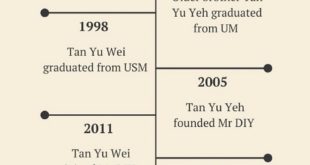Since Covid-19 first hit Singapore back in January, Singaporeans scrambled to snap up masks to protect themselves. Many also hoarded masks of all varieties to prepare for a pandemic.
As the demand increased exponentially, masks soon went out of stock islandwide. Even when the stock got replenished, they were quickly wiped out as well.

A quick search on Google Trends showed that the keyword ‘mask’ in Singapore recorded a huge spike in interest in the last week of January and in the first week of the ‘circuit breaker’.
In contrast, last year saw a rather flat outlook.
As demand hits an all-time high, Singaporeans who were not able to get their hands on masks panicked as they continued to face a shortage of masks on top of exorbitantly high prices dangled by profiteers.
Prices Increased By At Least 500% In Singapore
Pre-Covid-19, the usual price for a box of fifty surgical masks ranged between $ 5 and $ 7, according to mask importers that Vulcan Post spoke to.
Before they went out of stock at local pharmacies, Watsons and Guardian were selling them at between $ 12.50 and $ 15 per box.

After masks became scarce, prices skyrocketed and closed in on a price range of $ 30 to $ 35 per box — this is a whopping 500 per cent increase from its original price.
Scalpers were also seen trying to make a quick buck online as they too jacked up their prices. On online marketplace Carousell, prices ranged from $ 1.50 for a single non-reusable piece, to $ 30 to $ 40 for a box of 50.
Although the rising costs of face masks are bad news for consumers, it meant good business for face mask importers. We spoke to three of such importers to shed light on the mask situation in Singapore.
An Opportunity To Help Others In Need Of Masks
For John Menon of Anti Virus Club SG that sells medical essentials, he started the business in early February when he saw Singaporeans scrambling to get their hands on masks, sanitisers, thermometers and alcohol swabs.
“I realised my partners had stock that Singaporeans badly needed and I thought the best way to help was to make them available here,” said John.
He imports surgical masks from Vietnam, he said, adding that they rival the common three-ply masks found in the market these days.

“We have two arms to the business. The consumer arm supplies to consumers who purchase for family or friends and gift the masks for good causes, while the corporate arm supplies to private clinics and other businesses including Volunteer Welfare Organisations,” continued John.
Jeremy Low, the founder of Axtro Sports, a company that sells fitness tech gear, said that he initially wanted to help family members and friends who needed masks.
When customers started asking them if they stock masks, they decided to start bringing in masks through contacts they have established over the years, mainly Chinese manufacturers.
Switching Their Main Business To Importing Masks
On the other hand, some businesses in Singapore started importing masks overnight.
Among them was Ripple Technologies, a hardware/software development company for POS systems and solutions.
They started importing surgical masks from China since early March when some of their customers “complained that they could not get seem to get good quality masks in Singapore.”
Before Covid-19, we were supposed to enter a few markets in Southeast Asia to distribute our hardware and we had to pause that. Due to the F&B industry and various retailers being badly affected, our hardware sales are down to almost zero.
– Steve Hu of Ripple Technologies Pte Ltd
For Axtro Sports, whose main business is selling fitness tech gear, they also starting bringing in masks. They are also the company behind the fitness trackers for National Steps Challenge.

They wanted to diversify and get their stock from multiple sources, so they imported their masks from China, namely from factories in Xiamen, Shenzhen and Zhejiang.
According to these two firms, they are simply venturing into the face mask import sector because they want to survive and retain workers. This is simply another means for them to do business.
Dealing With Bogus Suppliers Was Part And Parcel Of It
For Anti Virus Club SG, John said that he experienced a close shave with one dishonest supplier.
After almost getting cheated by another supplier, I made the decision to fly to Vietnam myself to source for multiple manufacturers that would be able to provide competitive pricing and the best possible quality of masks.
The trip was necessary to ensure the people we wanted to help got the help they needed even though it meant that I had to go on Stay-Home Notice the moment I come back.
– John Menon of Anti Virus Club SG
He also encountered factories in China that claimed they were certified, but were not being able to show the necessary certifications such as ISO standard.
This is apparently very common in China, as the country recently confiscated more than 89 million shoddy face masks.
“As a local supplier, we have had our fair share of having to sieve through scams at the supplier level. We do have companies in other countries claiming to have the stock you need but are not legitimate middle men,” said John.

Meanwhile, Jeremy said that Axtro Sports has a quality control team in China to personally visit the factories to check on the quality.
Singapore Importers Face Global Shortage Of Face Masks
Before Covid-19, mask production in China accounts for 50 per cent of global mask production. In terms of mask production capacity, they are the strongest country worldwide.
To curb the supply shortage, a lot of companies have converted to manufacturing masks in China and production has increased nearly 12-fold since then.
However, China itself was facing a shortage of masks — especially in hospitals — so they were driven to import masks from other countries, such as Japan, India and the United States.

After China, the second-largest producer of face masks are countries like India, United States and Taiwan. Taiwan, in particular, produces 15 million masks a day to meet the demand for face masks.
However, as these countries raced to step up their production to meet the booming demand, there was still a global shortage of face masks.
Delays And Restrictions Exacerbated The Shortage Situation
According to Jeremy, during pre-Covid-19 days, stock typically takes 2 to 3 days to arrive via air courier from DHL or FedEx. Now, they are expecting 10 to 14 days on average for the stock to arrive.
“On April 14, the Chinese authorities clamped down on mask exports. They [expanded] export checks for all kinds of masks using Chinese ports, leading to a huge backlog in terms of PPE (personal protection equipment) at four major airports in China and seaports,” he explained.

For cleanroom disposable products distributor GSG M&S Pte Ltd which supplies mostly to factories, they said that there was a restriction for the export of face masks.
“Since half of the face mask production is in China, there was a massive shortage in the months of February and March,” said Roger Han of GSG M&S Pte Ltd, referring to the early days when China was the epicentre of Covid-19.
Luckily, they still had more than 300,000 masks in stock when China started the lockdown of Wuhan. The lockdown in Wuhan set the precedent for similar measures in other Chinese cities, and it did not help that there was already supply disruption due to shutdown for Chinese New Year in China in January.

Our masks are meant for our regular customers to tide through February and March, but we are also mindful that people, especially frontline service staff, were badly in need of masks to protect themselves. We have to work out exactly how many cartons of masks we can allocate to each customer and how many we can offer to sell to people who need them most.
Our priority was to sell to people or clinics that need the masks most. We also tried not to sell to distributors that would mark up [the prices] and resell them.
– Roger Han of GSG M&S Pte Ltd
Demand And Prices Show Signs Of Going Down For Now
John of Anti Virus Club SG said that the period that recorded the highest sales was ironically when the government advised Singaporeans to not wear masks if they are not unwell.
“Many customers told me that they wanted to wear masks to protect themselves from those that were not [wearing] them. So now that the stand has changed to ‘we all must wear masks’, people feel a lot better that everyone in public is also wearing a mask, so sales have slowed a little,” said John.
“Sales was highest between end March and early April when our manufacturing customers stocked up. The demand for face masks is still strong now, but there are also many suppliers that import in directly from China. Prices are not as crazy as in February or March,” said Roger.

Axtro Sports is selling at the cost price of $ 29 per box of fifty 3-ply disposable masks. They are looking to bring the costs down as much as possible by sea freight as costs have increased by 50 per cent in April alone by air freight.
They are bringing in about 1,000 boxes by air freight every week and only sell directly to consumers instead of resellers, in case the latter resells the masks at a higher price.
They are expecting an increase in demand again as people return to school and offices, trusting that masks will still be a part of our daily lives.
Anti Virus Club SG echoed the same thoughts. “We expect sales to pick up once people are allowed to go back to work as they do need to protect themselves while out in public daily,” said John.
Face Mask Import Could Be A Bulletproof Industry

It’s not a seasonal business for sure. Hospitals, factories and individuals need masks all year round.
Even after Covid-19 has blown over, face masks will continue to be a coveted commodity as they are supplied regularly to hospitals and factories.
Furthermore, we may all start to stockpile masks in our homes, fearful of the next time we have to scramble again to get our hands on basic medical supplies.
Countries too may stockpile (more) supplies to better prepare themselves when a pandemic happens again.
As citizens and medical personnel on a global level struggle with the lack of masks and eventually succumb to the virus, this pandemic has taught us a very valuable lesson: always be prepared for the future.
Featured Image Credit: Anti Virus Club / Axtro Sports



